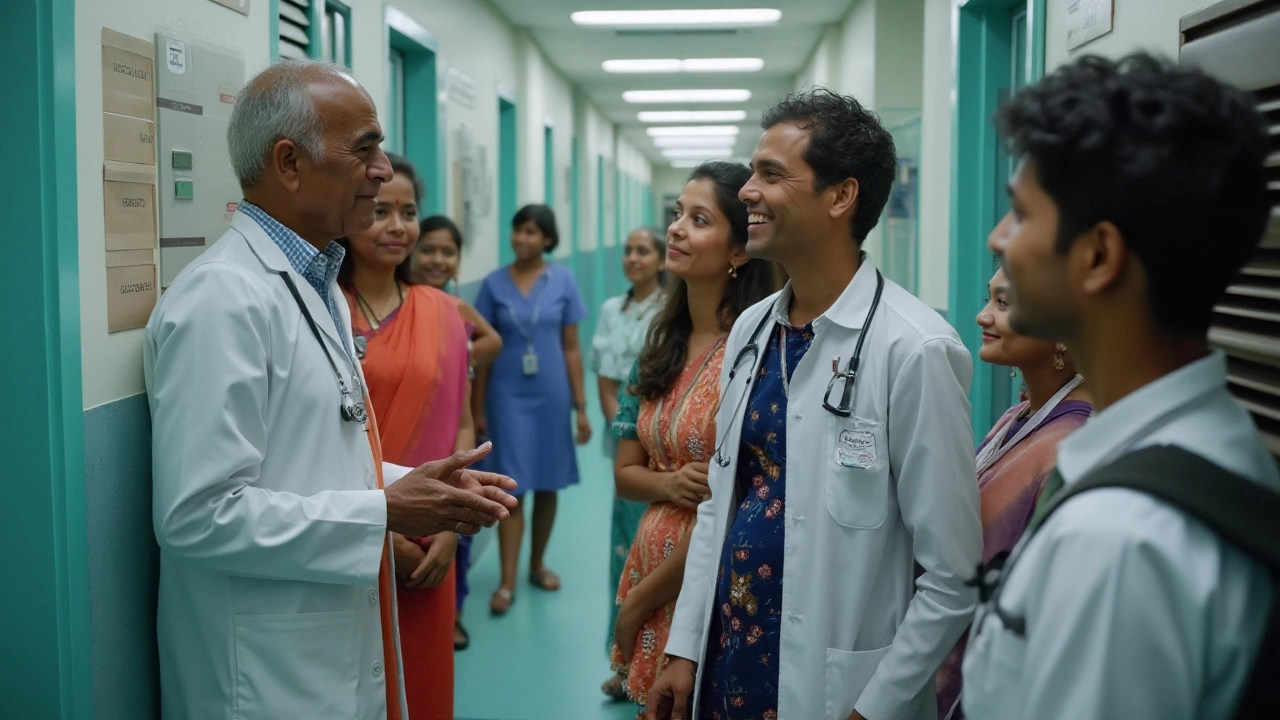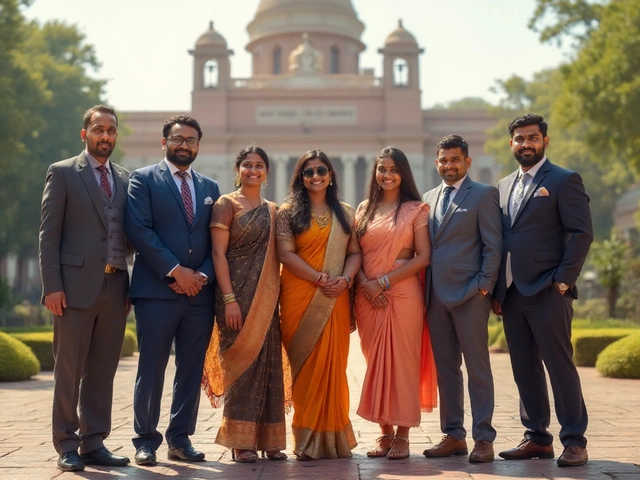
Choosing the right medical path after clearing NEET is a significant decision for many aspiring doctors. With a plethora of options available, it's essential to dive deep into the world of medical specializations to find the right fit for you. This involves balancing personal interest, aptitude, and the future landscape of healthcare.
NEET is not just an exam; it’s a gateway to your medical career. This journey requires understanding various specialties, their roles, and how they align with your aspirations. Therefore, honing down on a specific area is not just about scores but about envisioning where you see yourself in the vast field of medicine.
Explore this guide to demystify the paths you can take and get insights from experienced practitioners who have carved their niches post-NEET. As you embark on this journey, let these insights aid in your decision-making, ensuring an informed choice about your medical career.
- Understanding NEET and its Importance
- Different Medical Specializations
- Factors to Consider When Choosing a Specialization
- Insights from Successful Doctors
- Future Prospects and Trends in Medicine
Understanding NEET and its Importance
Preparing for the National Eligibility cum Entrance Test (NEET) is no small feat. It stands as a pivotal examination for individuals dreaming of pursuing a career in medicine or dental fields in India. This test is not merely a requirement but a defining moment that shapes your medical career path. NEET acts as a funnel, channeling the thousands of aspirations into distinct pathways leading to the medical profession. A single exam brings together diverse elements like perseverance, deep-seated knowledge, and strategic preparation, all of which underscore its significance for aspiring doctors and medical professionals.
NEET has been structured to filter and recruit students purely on merit, making it a fair platform for assessing their readiness to tackle medical challenges. This exam replaces various state-level tests and institutional exams, providing a unified and equal opportunity for young aspirants to showcase their aptitude and fulfill their dreams of wearing the white coat. Every question in the NEET paper tests not only the textbook knowledge but also analytical thinking, problem-solving skills, and a student’s ability to perform under pressure. In this way, NEET is crucial in molding future doctors who are not just book-smart but can think critically in life-and-death situations.
The importance of NEET extends beyond the individual, impacting the healthcare system nationally. The quality of doctors that the system grooms through such examinations reflects in patient care and medical innovations. With India striving to enhance its healthcare infrastructure, producing skilled professionals is key. By standardizing medical entrance exams, NEET ensures consistency in the evaluation process, thereby elevating educational standards. Medical career aspirants need to recognize that NEET is not just an academic hurdle but an initial introduction to the discipline and rigor that the medical career demands.
A noteworthy aspect of NEET is the diversity it embraces. Students from various socio-economic backgrounds across the country prepare for this examination, thus promoting inclusivity in the medical domain. It's a challenging exam with competition from all states, and each candidate brings their own unique perspective and background into the field of medicine. According to a recent survey, nearly 16 lakh candidates registered for NEET, underscoring its vast reach and aspirational value.
"NEET provides a platform where all medical aspirants, irrespective of their background, can compete equally. It lays the foundation for creating a healthcare workforce that mirrors the diversity and brilliance of the nation." - Dr. Aiswarya Singh, Medical Education Expert
No discussion about NEET would be complete without touching on its rigorous structure. The examination covers a broad range of topics, encompassing Physics, Chemistry, and Biology, demanding a thorough understanding of each. Designed to be challenging, NEET serves to cultivate a culture of excellence and create professionals who possess a robust grasp over myriad subjects. The preparation phase often involves more than just study; it requires discipline and an acute understanding of concepts across these subjects. By excelling in NEET, students signal their readiness to commit to an enduring journey of medical education and professional development.
Different Medical Specializations
The journey after acing the NEET exam leads to a critical crossroads: choosing the best medical specialization. The vast field of medicine offers numerous branches, each with its unique demands and rewards. Understanding these areas can significantly impact your decision-making process. Thus, it's crucial to evaluate them thoughtfully. Let's delve into some of the popular and promising medical specializations available today.
Internal Medicine
Aspiring doctors often gravitate towards Internal Medicine, which is the backbone of healthcare. It involves a wide range of general healthcare practices that deal with the prevention, diagnosis, and treatment of adult diseases. This field calls for strong analytical skills and the ability to manage complex clinical situations, making it an intellectually stimulating choice. An interesting aspect of this specialization is its adaptability, as internists can choose to sub-specialize in areas like cardiology, gastroenterology, and rheumatology.Dr. Atul Gawande, a notable surgeon, once said, "The difference between mediocrity and excellence is often a matter of perspective." Internal Medicine offers this opportunity to transform from good to great by specializing further.
Pediatrics
On the other end of the spectrum, Pediatrics offers a chance to work with young children and adolescents. This field requires not only medical expertise but also a deep sense of empathy and patience. Pediatricians often play a vital role in preventive health care and must communicate effectively with both children and parents. Many students find satisfaction in nurturing the future generation and find this path incredibly fulfilling.Surgery
For those who thrive under pressure and possess great attention to detail, Surgery remains a top choice. Surgeons are at the forefront of medical innovations and are responsible for life-changing procedures. This specialization offers a variety of branches, such as orthopedic, neurosurgery, and plastic surgery, each requiring specific skills and techniques. It’s a demanding field but equally rewarding, offering the unique privilege to save and improve lives directly.In terms of popularity, NEET aspirants often consider specializations based on personal interest and potential career growth. According to a survey conducted by Medscape, nearly 25% of medical graduates opt for specialties from a financial perspective, with surgery and anesthesiology amongst the top choices due to their higher average compensation.
Radiology
Radiology is a non-invasive field that has seen significant technological advancements in recent years. Specialists in this area use imaging techniques like X-rays, CT scans, and MRIs to diagnose diseases. Radiologists are often crucial in providing accurate diagnosis, pushing the frontiers in medical science. This specialization requires a firm grasp of technology and a keen eye for detail. Radiology also offers subspecialties like interventional radiology and nuclear medicine, expanding its scope even further.With so many paths available, selecting a medical specialization is not merely about choosing a job but adopting a lifestyle. The medical field is continually evolving, making it essential for future doctors to remain committed to lifelong learning.

Factors to Consider When Choosing a Specialization
Choosing a medical specialization after NEET is a pivotal career decision, one that shapes your professional journey in the field of healthcare. Aspiring doctors should consider several important factors before they embark on a specific path. First, personal interest plays a critical role. Delving into a branch of medicine that genuinely fascinates you will keep you motivated and engaged throughout the demanding years of practice and study. For example, someone passionate about surgical precision may thrive as a neurosurgeon, whereas a person with a keen interest in children's health might find pediatrics fulfilling. Understanding one's intrinsic motivators is key to a happy medical career.
In addition to personal interest, it's important to assess your aptitude and skills. Each medical specialization demands specific skill sets and inherent abilities. Specialties like surgery often require dexterity and a calm, decisive nature, while psychiatry may need exceptional communication and empathy skills. Self-assessment or seeking counsel from mentors can provide valuable insights into where your strengths lie. Remember, thriving in a specialty is not only about mastering technical skills but also about aligning your natural abilities with the demands of the field.
Consider also the lifestyle implications of each specialization. Different fields offer varying work-life balances, with some requiring more on-call hours and emergencies than others. For instance, a career in emergency medicine may lead to unpredictable hours and stress, contrasting with dermatology, which often provides a more predictable schedule. Striking a balance that suits your personal life and well-being is crucial. Many doctors express the importance of this consideration, often overlooked by fresh graduates eager to dive into a particular area. As Dr. Fiona Godlee once remarked, "Finding a balance between professional ambition and personal happiness is often the unseen key to a fulfilling life in medicine."
Furthermore, it’s critical to keep in mind the current and future demand for various specializations. The healthcare landscape is constantly evolving, influenced by technological advancements, demographic shifts, and public health needs. Researching current statistics and trends can offer insights into which specialties are gaining traction and may be in higher demand in the future. Not only does this affect job availability, but it can also have implications on earning potential and career longevity. Reports suggest that fields like geriatrics and preventive medicine are expected to grow due to an aging population and increased focus on health management.
Additionally, consider geographic preferences and job markets. The demand for certain specialties might vary significantly by region. Urban areas often present different opportunities compared to rural settings, where a broader scope of practice may be required. If relocation is in your plans, researching how your preferred specialization fares in your target locations can be advantageous. This not only prepares you for potential challenges but also aligns your career trajectory with regional needs. Understanding these elements ensures that your decision is informed and strategic, ultimately leading to a more rewarding career path.
Insights from Successful Doctors
Embarking on a medical journey post-NEET examination is an adventure laced with lifelong learning. It’s crucial to glean wisdom from those who’ve tread the path before us. Successful doctors often emphasize the importance of choosing a medical career that resonates with personal passion while also considering the practical demands of the job. One prominent cardiologist highlighted that a doctor’s journey 'is not just about curing diseases but listening to what’s unspoken in a patient’s heart.' This signifies the deep connection and empathy required in a medical career, a sentiment echoed across various specializations.
Many thriving doctors have shared that the key to selecting a specialization isn't just in understanding the nature of the job but also in knowing oneself. A common piece of advice is to spend time shadowing different specialists, which provides a first-hand account of day-to-day life in varied medical fields. Dr. Aasha Mehta, a renowned pediatric surgeon, mentions that spending a few months in different departments during her formative years helped her understand the nuances of each specialty. This allowed her to align her interests with the type of environment in which she felt most effective.
Moreover, successful practitioners point out the necessity of staying updated with the latest in medical technology and research. The field of medicine constantly evolves, and so must doctors. The journey doesn’t stop upon picking a specialization; it requires continuous education. Many professionals attend workshops and conferences to ensure they’re practicing the most up-to-date medicine. The advent of telemedicine and AI in healthcare is also something that modern doctors are keenly incorporating into their practice.
“Medicine is not static; it’s a dynamic canvas where the brushstrokes of innovation are constantly adding new hues,” shares Dr. Sanjay Patel, a pioneering endocrinologist.
For those at the crossroads post-NEET, understanding the career possibilities is critical. Dr. Anita Rao, well-versed in medical mentoring, developed a useful data table through her research that illustrates potential career pathways based on different specializations:
| Specialization | Typical Salary Range | Job Opportunities |
|---|---|---|
| Cardiology | $250,000 - $500,000 annually | High demand in urban areas |
| Orthopedics | $200,000 - $450,000 annually | Growing need in sports and geriatrics |
| Pediatrics | $180,000 - $350,000 annually | Consistent demand across regions |
Understanding how each specialization fits into societal needs can guide aspiring doctors to make informed choices that not only fulfill personal ambitions but also cater to community exigencies. Hence, as you consider stepping into this noble profession, remember that the insights of successful doctors serve not just as advice but as a beacon leading you to your most suitable career path.

Future Prospects and Trends in Medicine
The field of medicine is continuously evolving, shaped by technological advancements, patient needs, and educational developments. Post-NEET, as future doctors like you ponder which path to tread, understanding the current and emerging trends in medicine is crucial. One of the most striking trends is the integration of technology into healthcare. Telemedicine, for example, has grown exponentially, driven by the necessity of remote care during the pandemic. According to a study conducted by McKinsey, telehealth usage has stabilized at levels of 38 times higher than before the pandemic. This shift is not temporary but rather an enduring change, calling for specialties that harness technology in diagnostics and treatment.
Another notable trend is the increasing focus on personalized medicine, which tailors treatments to individual genetic profiles. This is underscored by ongoing research in genomics and biotechnology, with huge investments being funneled into personalized healthcare strategies. Did you know that the global genomics market size was valued at USD 18.85 billion in 2021? As precision medicine becomes mainstream, specializations in fields such as genetic counseling will be in high demand.
"The future of medicine is a blend of the art of seeing the needs of individual patients and the science of leveraging their personal health information." - Dr. Eric Topol
Moreover, there's a growing call for holistic approaches in patient care. Integrative medicine, which combines conventional medical treatments with alternative or complementary therapies, is gaining attention. Patients increasingly appreciate a care model that considers their mental, emotional, and physical health. As medical practice becomes more patient-centric, there's a movement towards training doctors in fields like psychology and behavioral science alongside traditional medical domains.
Medical specialization choices also need to consider the shifts towards preventive care and public health. The pandemic has taught us the critical nature of public health infrastructure and disease prevention strategies. Education in epidemiology, virology, and public health is receiving renewed interest, and as a future doctor, exploring this field might align with emerging global needs.
Adapting to New Challenges
With climate change affecting health in various ways - from the spread of infectious diseases to respiratory problems – the field of environmental medicine is no longer niche. Understanding how our changing environment impacts health is crucial, and many medical schools are now embedding this in their curriculum. Future needs predict a demand for doctors who understand the intersection between the environment and human health.
Specialties offering remote healthcare solutions, innovations in genomics, and a grasp of global health challenges will undoubtedly shape the landscape for those entering medicine today. As you strategize your educational path post-NEET, these insights can guide you towards a fulfilling and impactful career.





